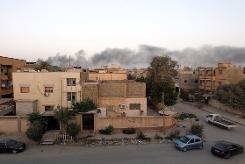WASHINGTON - The United Arab Emirates has secretly sent warplanes on bombing raids against Islamist militias in Libya over the past week, using bases in Egypt, US officials said.

Smoke billows from buildings during clashes between Libyan security forces and armed Islamist groups in the eastern coastal city of Benghazi on August 23, 2014
The two attacks carried out over seven days mark a dramatic expansion of the conflict as the United States and its European allies denounced "outside interference" in Libya.
The strikes signaled a step toward direct action by regional Arab states that previously have fought proxy wars in Libya, Syria and Iraq in a struggle for power and influence.
The bombing raids were first reported by The New York Times and Islamist forces in Libya also had alleged strikes had taken place.
"The UAE carried out those strikes," one of the officials told AFP on condition of anonymity.
Asked about the account, the senior US official said "the report is accurate."
The United States did not take part or provide any assistance in the bombing raids, the two officials said.
The first airstrikes took place a week ago, focusing on targets in Tripoli held by the militias, including a small weapons depot, according to the Times. Six people were killed in the bombing.
A second round was conducted south of the city early Saturday targeting rocket launchers, military vehicles and a warehouse, according to the newspaper.
Those strikes may have represented a bid to prevent the capture of the Tripoli airport, but the militia forces eventually prevailed and seized control of it despite the air attacks.
The UAE -- which has spent billions on US-manufactured warplanes and other advanced weaponry -- provided the military aircraft, aerial refueling planes and aviation crews to bomb Libya, while Cairo offered access to its air bases, the paper said.
But it remained unclear whether and to what degree Egypt and the UAE had informed the Americans in advance of the airstrikes.
When pressed on the issue, US officials could not confirm that Egypt and the Emirates had left Washington totally in the dark about the air attacks.
Neither the UAE nor Egypt publicly acknowledged any role in the air strikes.
- Common danger -
Egypt, Saudi Arabia and the Emirates view Islamist militants in the region as a serious threat and have forged cooperation against what they see as a common danger.
The Islamist groups that emerged after the Arab Spring uprisings in turn have enjoyed support from Qatar and Turkey.
The bombing raids came amid a Western diplomatic push for a negotiated settlement to quell the violence in Libya, where the government's authority has unraveled in the face of the Islamist-linked militias.
Britain, France, Germany, Italy and the United States issued a joint statement condemning an "escalation of fighting and violence" in Libya and urged a democratic, peaceful transition.
The Western powers expressed particular concern over violence "against residential areas, public facilities, and critical infrastructure, by both land attacks and air strikes."
Without mentioning any air strikes by the UAE and Egypt, the statement said "outside interference in Libya exacerbates current divisions and undermines Libya's democratic transition."
The governments welcomed upcoming discussions at the UN Security Council on Libya and said "we encourage the international community to support Libya's elected institutions."
The air strikes also underscored how Washington's old allies are more willing to act on their own, without backing from the Americans.
Saudi and UAE leaders in particular have expressed concern that Washington can no longer be counted on, citing US diplomatic overtures to Iran and a cautious approach to the Syrian conflict.
The strikes in and around Tripoli demonstrated the UAE's readiness to employ its air power, as the Emirates have built up one of the region's most proficient air forces with American gear and training. UAE pilots flew combat missions in the NATO-led air war in Libya in 2011.
Over the past decade, the Emirates have purchased dozens of US F-16 fighter jets, as well as transport aircraft, precision-guided bombs and advanced missiles for their warplanes.
About 5, 000 American troops are based in the Emirates, most of them airmen stationed at Al-Dhafra Air Base.

No comments:
Post a Comment
thank you..moderator will approve soon..your email will not be published..